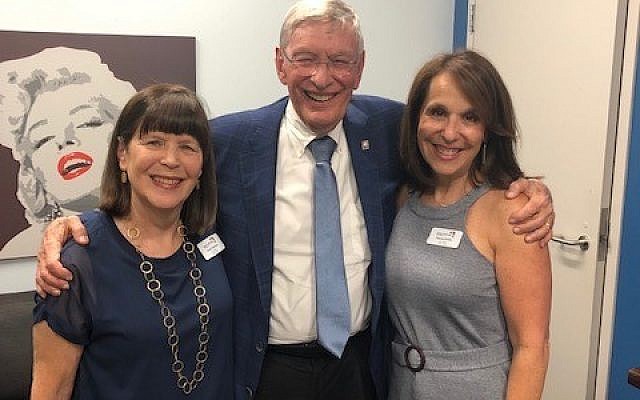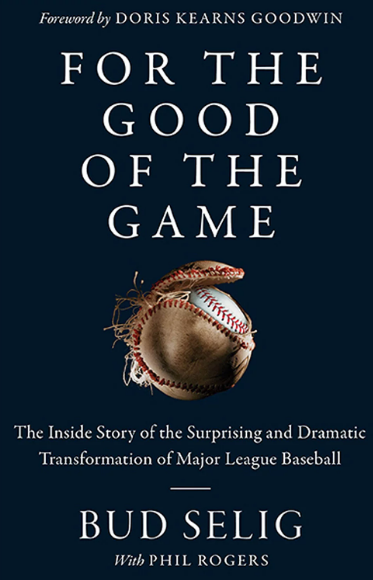At 85, Selig Reflects on Baseball Legacy
Bud Selig's new book, “For the Good of the Game,” was published July 9. He appeared at A Page From the Book Festival July 11 at the Marcus JCC.

For 22 years, Bud Selig was the commissioner of baseball, a job that, arguably, made him one of the most influential figures in the history of the game. He is generally credited with the transformation of the sport into the economic success that it is today. The National Baseball Hall of Fame elected him to membership in 2017.
His new book, “For the Good of the Game,” was published July 9. He appeared at A Page From the Book Festival July 11 at the Marcus JCC. We spoke to him last week as he prepares to celebrate his 85th birthday at the end of this month.
AJT: Among your most significant accomplishments as commissioner was advancing baseball’s commitment to diversity. You created the annual Civil Rights Game, for instance. How much of that commitment grew out of your youth as a part of the Jewish community in Wisconsin?
Selig: I was kind of a shy kid growing up but when I went to the University of Wisconsin in Madison and joined the Jewish fraternity there, Pi Lambda Phi. I learned a lot about the value of human relationships that helped me during the rest of my career. I became president of the fraternity my second year there.

We had a waiter in the house named Charlie Thomas who was a black football star, a fullback. He was fine and very smart and everybody loved him. I told him that he should pledge the fraternity. He looked at me like I was nuts.
Remember, this was 1955 and Emmett Till, a black young teenager had just been brutally murdered in Mississippi. But he [Thomas] agreed, and so I took it from there. We had a big meeting that went on for four or five hours and I told them we’re not leaving here until we get this done. He became our first black pledge. He went on later to become superintendent of schools in Evanston, Ill., outside Chicago, and we maintained a warm friendship.
AJT: When you graduated I believe you wanted to be a history professor, but your father had other ideas.
Selig: Yes, my father had an amazing influence. He and my mother came to America as poor Jewish immigrants from Russia. He was a terrific salesman and eventually he owned a Ford dealership in Milwaukee. Built it into the largest dealership in Wisconsin. We were extremely close. He was a terrific salesman, a hard worker and the kindest person I’ve ever met in my life.
When I got out of school and after I was in the service, I told him I wanted to become a history professor. He said, ‘Do me a favor and give me one year in the business.’
Well, I did, and the rest is history. After 22 years as commissioner I teach today. “Baseball in American Society” is the name of the course, 1945 to the present. I teach at the University of Wisconsin, at Marquette Law School in Milwaukee and at Arizona State.
AJT: And how did this career in business evolve into this passion for baseball?
Selig: I had a passion for it, even as a kid. I can remember when I was 2 or 3 years old my mother always had the game on the radio. I was a huge fan, more than a fan, and never dreaming that all this would happen. But the Braves left Milwaukee and I was just a young guy but we fought for 5 ½ years to make Milwaukee a major league town again, which taught me a lot about tenacity and patience.

AJT: And do you think it helped or hindered you being Jewish?
Selig: When I came into baseball the only Jewish person in management before me was Jerold Hoffberger, the owner in Baltimore. There were no Jews in the league offices, none in the commissioner’s office, none anywhere. Only two years later I became commissioner of baseball. So that’s a tribute to baseball too.
AJT: Why do you think American Jews have made such an enormous contribution to this game?
Selig: Well they have, no question about it. Take Hank Greenberg, Sandy Koufax, Al Rosen. Oh, my goodness. They have played a dramatic role and as a result, sociologically, as I said to you, baseball is a social institution. And I’m very happy that we’ve done what we’ve done. I don’t know that I know the answer to that, but I know that we have.
“For the Good of The Game: The Inside Story of the Surprising and Dramatic Transformation of Major League Baseball” by Bud Selig with Phil Rogers, was released last week by HarperCollins Publishers.



comments